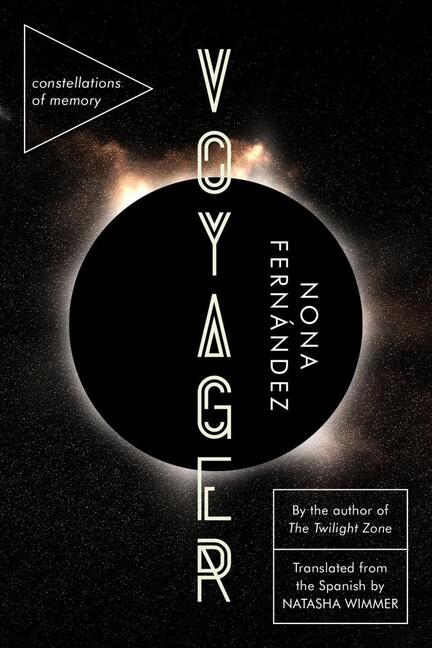Voyager: Constellations of Memory
Nona Fernández
|
When you purchase a book through our site, we earn an affiliate commission and so do independent book stores.
|
When her mother begins suffering fainting spells, losing consciousness and waking moments later with no memory of what occurred, Nona Fernández takes her to the hospital for an electroencephalogram test. There, the author observes her mother’s brain on a monitor, watches the imaging as the doctor instructs her mother to think of a fond memory. Suddenly, the monitor lights up, flashing like “an imaginary chorus of stars,” the electrodes attached to her scalp translating her brain’s electrical activity into a sight curiously reminiscent of a starscape. Parting from that image where memory and the stars are intimately intertwined—in which deliberate recollection illuminates the present and helps steer future action--Voyager: Constellations of Memory embarks on a potent exploration of memory that seeks to understand the role it plays in the creation of our personal narrative and identity. The “record” that is our memory “describes and reveals us,” argues Fernández. “Disjointed fragments, a pile of mirror shards, a heap of the past. The accumulation is what we’re made of.” But if the “archive of memory” is indeed the backbone of who we are, as Fernández suggests—a composite made up of past celebrations and losses, rich with the faces of those we love and who’ve loved us, a record of the mistakes we made once and will never make again—what occurs then when we forget, when we lose parts of it to the black holes the author calls “space-time parentheses”? And what is gained when we remember? These are some of the central questions underpinning Fernández’s autobiographical essay, propelling the author forward as she draws from astronomy, neuroscience, Greek mythology, and astrology to make sense of her past and present. |
But just as Fernández and translator Natasha Wimmer’s previous collaborations Space Invaders and The Twilight Zone collapse any notion of a division between the personal and the political, Voyager, too, broadens its scope to consider how these questions of memory and loss can be applied in the context of Chile and its fraught political history. In the process of drafting the book that would eventually become Voyager and grappling with her mother’s worsening illness, Fernández is invited to sign a petition endorsing the creation of a new constellation in the sky—the Constelación de los Caídos, enacted in remembrance of the twenty-six Chileans executed and then disappeared by the authoritarian military dictatorship’s Caravan of Death in the Atacama Desert in 1973. It is Fernández’s reflection of this experience—her being named the godmother of the star belonging to Mario Argüelles Toro, a socialist leader and salesman; the conversation she has with his widow, Violeta; and her experience attending the memorial’s devastating and tender inauguration—that most clearly posits memory as a salve in the face of shared trauma and loss, a binding force tying people together in the wake of great suffering. In the absence of bodies to bury, it is the recollection of the caídos and the collective sorrow experienced by their families that keeps the horrors and human rights violations of the dictatorship from fading into a “space-time parenthesis.” It is the radical refusal to forget, steadfast in the face of a past in which dissidents were censured and exiled and disappeared, which offers hope for a Chile that could one day reckon with its past and rebuild itself anew.
Brimming with the same undaunted curiosity and empathy that has long characterized Nona Fernández’s oeuvre, Voyager is an illuminating study that grapples eloquently with the politics of memory and remembering, casting a discerning eye over Chile’s past and present as it returns again and again to the same questions, searching for newer and greater answers each time: Who are we? Where are we going? How do we make sure such things never happen again?
Nona Fernández (she/her) is a Chilean writer and actress. Born in 1971, she is the author of two plays, a collection of short stories, a work of nonfiction, and six novels, including Space Invaders and The Twilight Zone, which was awarded the Sor Juana Inés de la Cruz Prize.
Natasha Wimmer (she/her) is a literary translator. A visiting lecturer at Princeton University and Columbia University, she is best known for translating the works of Roberto Bolaño, Álvaro Enrigue, and Nona Fernández from Spanish to English. She is the recipient of an NEA Translation Grant and the PEN Translation Award.
Voyager: Constellations of Memory is a publication by Graywolf Press.
Brimming with the same undaunted curiosity and empathy that has long characterized Nona Fernández’s oeuvre, Voyager is an illuminating study that grapples eloquently with the politics of memory and remembering, casting a discerning eye over Chile’s past and present as it returns again and again to the same questions, searching for newer and greater answers each time: Who are we? Where are we going? How do we make sure such things never happen again?
Nona Fernández (she/her) is a Chilean writer and actress. Born in 1971, she is the author of two plays, a collection of short stories, a work of nonfiction, and six novels, including Space Invaders and The Twilight Zone, which was awarded the Sor Juana Inés de la Cruz Prize.
Natasha Wimmer (she/her) is a literary translator. A visiting lecturer at Princeton University and Columbia University, she is best known for translating the works of Roberto Bolaño, Álvaro Enrigue, and Nona Fernández from Spanish to English. She is the recipient of an NEA Translation Grant and the PEN Translation Award.
Voyager: Constellations of Memory is a publication by Graywolf Press.
|
Comment Box is loading comments...
|
|









